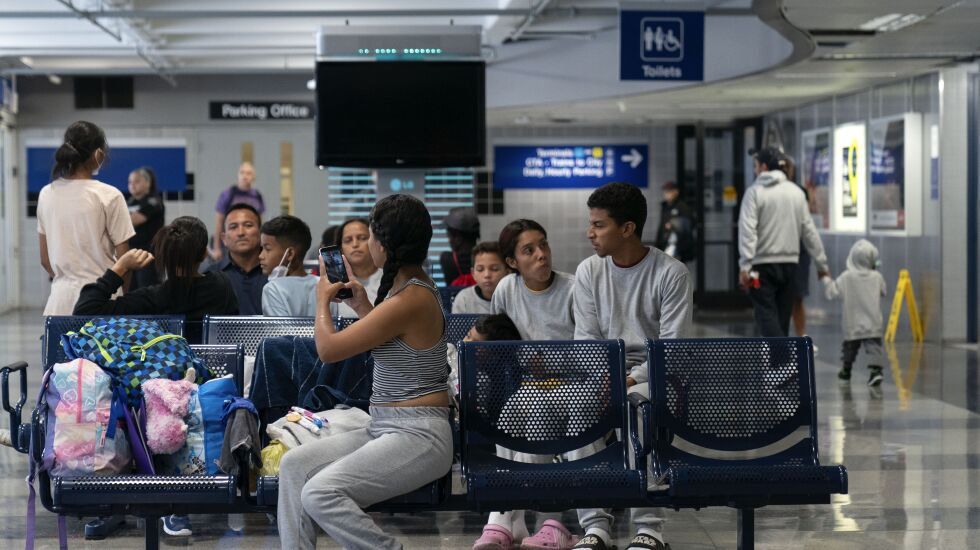
Our city is just now on the brink of recovery from the pandemic, including its economic setbacks. We are experiencing continuous unease about crime, high rates of office vacancies, taxes and more. All of which makes the presence of more than 13,000 migrants — who are unhoused, unemployed, and without income or resources — a source of increased anxiety and a potential threat to tear apart longstanding political and civic alliances between Black and Latino communities.
While I have taken a strong position on the situation, that position has been distorted as others have publicly tried to define it, rather than hearing from me. I write this to clarify my position and forge a better path forward.
Let’s start at the beginning. The city has never had an official “sanctuary city” ordinance. Rather, in 1985, then-Mayor Harold Washington issued an executive order declaring Chicago to be a ‘welcoming city’ where “the City will not ask about your immigration status, disclose that information to authorities, or, most importantly, deny you City services based on your immigration status.” Three decades later, under then-Mayor Rahm Emanuel, the City Council affirmed that position in an ordinance.
That’s all. Nothing more. Nothing less. No discussion of housing; no discussion of money for immigrants; no discussion of anything except an agreement to provide routine city services and refusal to turn over any immigrant or undocumented person to federal Immigration and Naturalization Service (now Immigration and Customs Enforcement, or ICE) officials on matters relating to civil immigration law.
This position, with which I wholly agree, made sense then and makes sense now. What I cannot agree with or support, and which was never in Mayor Washington’s ordinance, in any subsequent documents, or in my proposed ordinance, is the expenditure of scarce Chicago and Cook County resources to financially support this group of unfortunate individuals and families.
Why? Because as an alderperson, as a steward of the city’s very scarce resources, I know we cannot afford it.
Even before the migrant crisis, the city had a budget deficit of more than $500 million. The additional costs of migrant services are now $31 million a month, with another $2 million per month being spent by the county health care system. Given the increasing rate of arrivals, with 27 busloads in the past week alone, these likely additional costs could easily surpass half a billion dollars a year.
If Chicago were a wealthy city with deep pockets, it might be sustainable — but we’re not. Of our 77 communities, there are 26 in which family income is below the national poverty line and only 11 in which the per capita income is more than $50,000, according to the Chicago Community Area Hardship Index, which is based on census data. Among Chicago families citywide, 21% have household incomes of less than the national poverty rate of $23,000. And 25 communities have an unemployment rate over 13%, including six where it hovers between 19% and 30%.
While Texas Gov. Greg Abbott is certainly canny, it is easy to see what he is trying to do. While he says he’s showing the hypocrisy of “sanctuary cities,” he has sent busloads and planes mostly to cities with large Black and Latino populations, creating tensions that threaten to break up historic alliances.
So, yes, I, like all, want to keep the bond with migrants. Capital flows freely, and so should labor.
The ordinance that I will introduce will call for us to vote on:
- Maintenance of non-cooperation with ICE;
- Insistence that this federal issue be dealt with by the federal government, including coordination for migrants to be sent to all cities in every state nationwide, from Durango to Detroit, from Seattle to St. Augustine, and all points in between;
- In the interim, federal reimbursement of all migrant-related city expenditures;
- Protecting migrants and communities by housing migrants in the many closed churches, schools, armories and commercial buildings, rather than creating tent cities;
- As a home rule city, capping the number of migrants we will take at 15,000 or setting an end date after which we will accept no more
When thinking about our future, and thinking about new policies and programs, let’s make sure we get our history and our facts straight.
Ald. Anthony A. Beale represents the 9th Ward on Chicago’s Far South Side.
Send letters to letters@suntimes.com
The views and opinions expressed by contributors are their own and do not necessarily reflect those of the Chicago Sun-Times or any of its affiliates.







